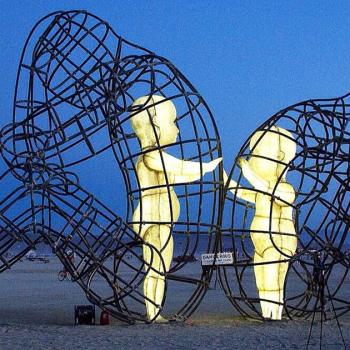
I hear a lot of talk about cancel culture these days, especially in church, spoken of in hyped-up, defensive tones, but the warning doesn’t ring true in my ears. The fear seems to be that the liberals are coming for the church, to ban Christians from saying what some believe about homosexuality. In the fever-heat of perceived threat, it is easy to imagine this embargo on religious views being extended to belief in general, evoking fear of creeping persecution.
If we accept for the moment that cancel culture exists, where does it come from? It’s often assumed that cancel culture is driven by the Left, because liberals tend to want to include everyone, and get into power struggles with those who don’t. For example, J. K. Rowling, the author of the Harry Potter series, has been largely rejected by the Left for her vocal stance on trans-women. By and large the Left wants to include trans-women, accepting that they are allowed to define themselves in their own terms, and so react angrily to Rowling, who publicly tells trans-women who and what they are (and aren’t).
Those with more traditional views feel attacked by proxy, when people like Rowling are ‘cancelled’, and by cancelled I mean de-platformed. Perhaps an invitation to speak has been rescinded, or some other removal of privilege has occurred. The general fear is that traditional views will become not only unwelcome but banned, which will put religious folk (from diverse faith traditions) in a difficult position. If being honest about a particular view becomes illegal, traditionalists of all stripes would either have to hide their beliefs or face sanctions. Personally, I don’t know a single person in the LGBTQ community who desires this outcome, but it is feared nonetheless. A pastor of a church I used to attend warned of a ‘wave of woke’ about to break over our ship – a wave I don’t believe exists or is coming.
Contrary to popular opinion, Cancel culture is not always from the Left, or from liberalism in general. Take Colin Kaepernick – the American footballer who chose to kneel during the US national anthem as a protest against police brutality. He was publicly eviscerated by the US President for his quiet, dignified protest, and turned on by half his country. He received hate mail and death threats, and every attempt was made to drive him from his career. This cancellation came from the Right, not the Left. It sprang from furious traditionalists and nationalists, outraged that Kaepernick used his platform to speak up against institutionalised racism.
Similarly, I watched a video today, in which a striking miner was attacked by an angry right-winger, who didn’t seem to care that the guy he attacked was fighting for his pay and conditions as well as their own. Sadly, violence and intimidation against those on strike has become the norm on US picket lines. This is right-wing cancel culture at work, which shouldn’t be a surprise, given that cancel culture has historically come from the establishment.
In post-war Britain, many gay men were denuded of medals, charged with a criminal offence and chemically castrated. The most famous case is that of Alan Turing – the hero who solved the enigma code, without whom the Allies might have lost the Second World War. Tragically, Turing committed suicide in 1954. The cancellation of homosexuality did not come from the Left, but from the Right.
Women lived under the chains of patriarchy for the entirety of human history until they got the vote, and let’s face it, the fight for equality has not yet been won. Women’s voices were muted, their free-will and self-determination curtailed and controlled by the powers that be.
And what of slavery? Africans and Afro-Caribbeans were held captive by Western nations for centuries, their cultures trampled on, their families destroyed, and their hopes rubbed out. How is this not the very worst form of cancellation? It is only in the context of awful, historic cancellation, that left-wing cancel culture can be understood. That said, I don’t believe that de-platforming is a solution, or that the left-wing version of cancel culture will bring people together.
The more I think about it, the more I’m convinced that most people indulge in a little cancellation, whatever their socio-political leanings. A friend recently said to me: “I used to like Cliff Richard until he wrote that book saying it was okay to be gay – now I don’t listen to his music anymore!”
Many traditionalists in Britain turned on the Manchester United player, Marcus Rashford, for speaking out against societal ills, and for his stance on taking the knee in protest against racism. He has received death threats and racist taunts, from those who would like to ruin his career and remove his public platform. Whether from the Left or the Right, a religious organisation or a secular body, cancellation is rife, and yet many Christians perceive only one side of the coin.
It is short-sighted, in my view, for traditionalists to feel the pinch of societal pressure and cry ‘cancel culture!’, without understanding that those who oppose their views are speaking from a place of deep historic injustice, having experienced far worse forms of cancellation. Or knowing and loving those who did. Compassion and empathy is required, along with at least a dash of repentance, rather than a hasty erecting of defensive barriers.
So, if cancellation and de-platforming comes from all sides, isn’t the issue cancellation itself, rather than a particular brand of cancellation? Why are there so many intolerant snowflakes, from the knee-jerk, right-wing reactionary to the soft-bellied, lefty liberal? Why are people so easily offended? If we can’t exchange views freely and without defensiveness, then there’s no ongoing dialogue, and without dialogue, we will be unable to learn from each other and remain stuck in echo-chambers instead, becoming ever more entrenched in our positions. For me, the only way to build bridges between people of disparate and even opposing views is to cancel cancellation.












